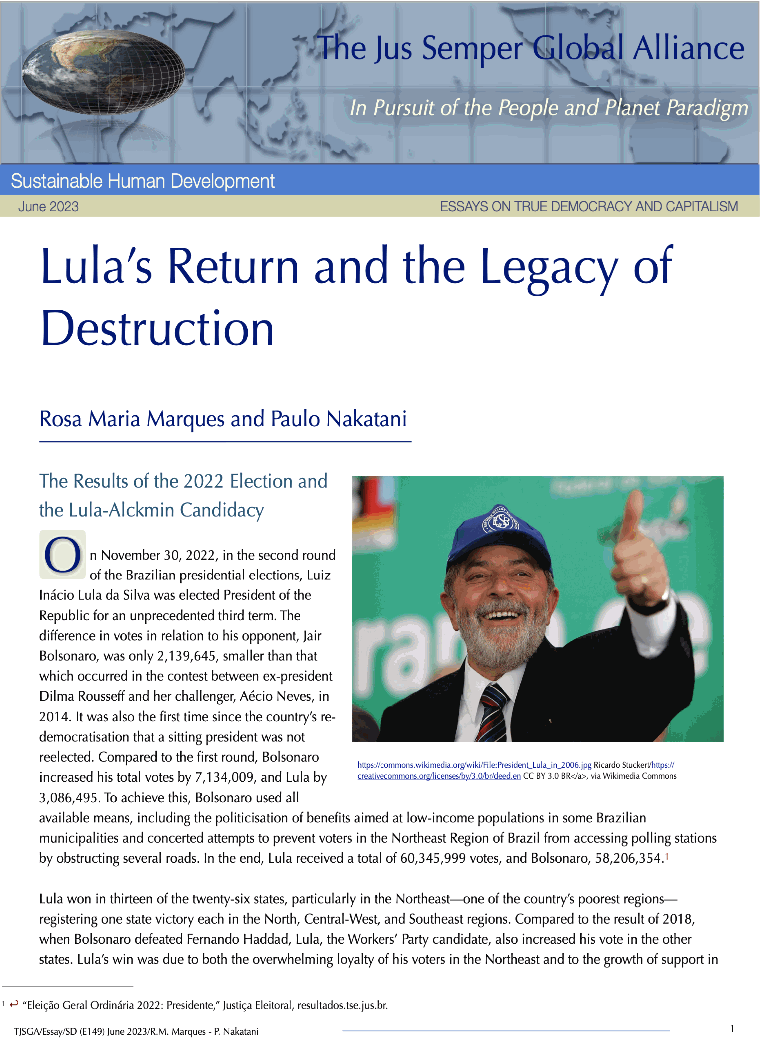Destruction
Rosa Maria Marques and Paulo Nakatani Lula was elected by the democratic group Frente Ampla (Broad Front), also known as the Coligação Brasil Esperança (Brazilian Hope Coalition). This coalition brought together extremely diverse political forces, including political leaders who until recently would not even speak to each other. The union of so many disparate groups and classes expresses a recognition of the absolute necessity of preventing Bolsonaro from continuing in government. The contest was presented as a struggle between civilisation and barbarism. Not only did the Bolsonaro government promote the dismantling (using the word in its literal and not figurative sense) of the state—thereby implementing brutal, previously unthinkable, reductions in resources for education, for science and technology, and for programs aimed at women, among others—it also armed the population, promoted the largest deforestation of the Amazon region in Brazil’s history, and inflamed racism, sexism, religious intolerance, attacks on Indigenous peoples, and hatred toward LGBTQIA+ groups. On the economic and social plane, the destruction has been no less dramatic. As an indication, investment (private and public) has never been so low, and Brazil has reappeared on the Map of Hunger, Poverty and Food Insecurity. This situation, briefly described above, does not mean that nobody benefited from the policies implemented by Bolsonaro and, before him, by Michel Temer, who assumed the presidency when Rousseff was removed from office. Quite the opposite: in addition to serving interest-bearing capital in the form of large national banks, foreign pension and investment funds, and Petrobras shareholders, who link their pricing policy to the international market, they served the interests of agribusiness through the unprecedented liberation of the use of pesticides and the abandonment of surveillance and fines that previously inhibited exploitation of land in the Amazon Rainforest; of unrestricted mining and extraction firms through state-sanctioned trespassing onto Indigenous lands and the Amazon; and of those involved with the production and sale of weapons and with the criminality associated with, or developed by, militias in important capitals and cities. The Frente Ampla, headed by Lula, formed against the backdrop of this contradiction of interests. For many representatives of the ruling class and important institutions of Brazilian society, it became unacceptable to witness the continuing deterioration of the social fabric, growing scientific denialism, and total contempt for human rights and democratic principles. Regarding the political program of the Frente Ampla, which bears marks of the Workers’ Party’s ideas, it is necessary to differentiate the “campaign promises” to be implemented immediately from those intended to reverse the social and economic situation and the destruction of the state apparatus resulting from the last six years of conservative governance. There are also structural issues within Brazilian society that can no longer be tolerated, as they form the base for racism, femicide, extreme inequality, and the genocide of Indigenous peoples. Furthermore, there are aspects related to Brazil’s continuing dependence on the interests of big international capital.
For a full read of this brief, click here or on the picture to download the pdf file.
|

- © The Jus Semper Global Alliance
| Home |  | Resources |  | Democracy Best Practices |  | Lula’s Return and the Legacy of Destruction |


